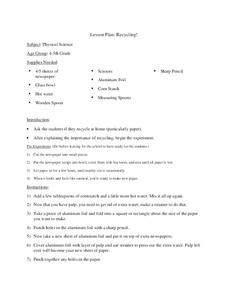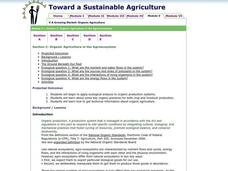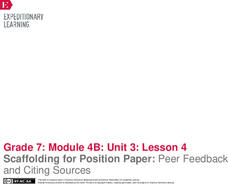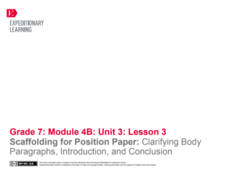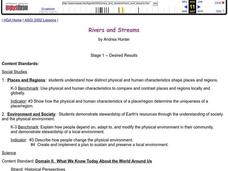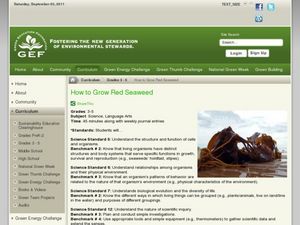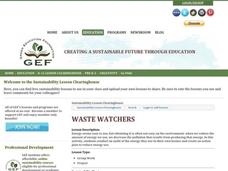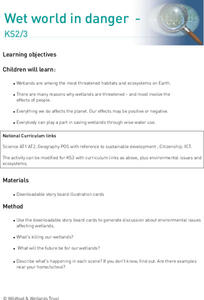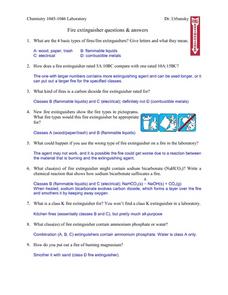Curated OER
Recycling!
Students explore environmental awareness by participating in a recycling activity. In this sustainability lesson, students identify methods in which things can be reused, such as paper. Students utilize aluminum foil, a bowl, water,...
Curated OER
Management of Commercial Fisheries, Part 2
Students examine the differences between the past vs. the present fishing and the uses of fisheries. In this investigative lesson plan students complete a worksheet and learn to think critically in order to protect our...
Curated OER
Management of Commercial Fisheries, Part 3
Students search the Internet and write a research paper on the environment. In this investigative lesson students develop a paper on fisheries and management of them.
Curated OER
The Greening of Mars: The Changes Necessary to Sustain Life on Mars
Fifth graders discuss the currents conditions on the planet of Mars. In groups, they work together to develop a mechanism that allows for a balanced ecosystem to survive on the planet. After presenting their ideas to the class, they...
Curated OER
Non-nutrients: Fiber and Water
Students will identify the sources and function of carbohydrates and fiber and apply appropriate food preparation techniques.
Curated OER
Toward a Sustainable Agriculture
Students analyze organic production systems. In this organic agriculture lesson, students examine key organic practices for both crop and livestock. This lesson includes 5 different activities, 4 critical thinking questions and...
Curated OER
Field Work
Students realize that everyone lives in a watershed and that water is a fundamental life sustaining resource, they investigate ways to look at surface streams for quantity and quality of this vital resources. Students construct a...
Curated OER
What Makes A Community Sustainable
In this environment worksheet, students read three different case studies in order to apply them to the categories of finding the best possible choices to make for helping a community flourish.
PreKinders
Garden Word Cards
Whether you are starting a class garden, reading a story about gardens, or want to teach your little ones about sustainable living, these vocabulary cards are a great introduction. Featuring words like watering...
Alabama Wildlife Federation
Mesh Bag Collector
Who knew bugs could be so informative? A hands-on activity has pupils assess the sustainability of a water ecosystem based on the presence of invertebrates. The class places a homemade trap in a local pond, and after several weeks,...
EngageNY
Scaffolding for Position Paper: Peer Feedback and Citing Sources
It's all a process. Scholars watch as the teacher models a peer feedback process. They then carry out the process on their own using the Sustainable Water Management Peer Feedback Form. As a bonus, individuals then participate in an MLA...
EngageNY
Scaffolding for Essay: Planning Body Paragraphs for Position Paper This work is licensed under a Creative Commons Attribution-NonCom
Scholars begin creating a plan for their position papers using a Sustainable Water Management Position Paper Planner. They talk with partners about their claims and counterclaims for the essays. Writers then work independently to...
EngageNY
Scaffolding for Position Paper: Clarifying Body Paragraphs, Introduction, and Conclusion
Let's have a talk. Scholars talk through the body paragraphs of their Sustainable Water Management position paper with peers. They take turns explaining their work to one another. They then begin to work independently on the introduction...
EngageNY
Mid-Unit 3 Assessment: Drafting the Position Paper
Organize your thoughts! Scholars work on the drafts of their position papers about sustainable water management. The draft serves as their mid-unit assessment. Before beginning, the class discusses the prompt and then learners work...
Curated OER
How to Grow a Sunflower Plant
Learners explore botany by conducting a sunflower growth experiment. In this plant life lesson, students identify the anatomy of a sunflower plant and the essential nutrients it requires to grow. Learners utilize compost, soil, garden...
Curated OER
Rivers and Streams
Learners research the rivers, streams and water bodies of Hawaii. They read a variety of books, play Bingo with water-related terms, create and maintain water-themed journals, view videos, conduct Internet research and participate in a...
Curated OER
How To Grow Red Seaweed
Young scholars explore ocean biology by participating in a plant growing activity. In this seaweed lesson, students identify the importance and uses of seaweed in the ocean and examine different seaweed samples. Young scholars utilize an...
Curated OER
Make a Windmill
Learners explore Earth science by conducting an energy experiment in class. In this windmill lesson plan, students identify how wind has been used to pump water throughout history and the latest developments wind energy has produced....
Curated OER
Waste Watchers
Energy-aware learners conduct an audit on their electricity usage by recording their electric meter reading and assessing the thermostat, light bulbs, windows, and water heaters in their homes. In class, they analyze results and discuss...
Curated OER
Workshop: Health Challenge
Students conduct Internet research in order to better understand the concepts of sustainable health design. For this design and architecture lesson, students gather data and creat a materials kit that responds to the challenges of health...
Curated OER
Editorial Writing
Use your class's knowledge of pollution and water treatment to write an editorial to town citizens. They apply prior knowledge in order to compose a letter intended for newspaper publication, focusing on writing to an appropriate audience.
Curated OER
Wet World in Danger
Young scholars investigate the reasons why wetlands are threatened especially by people. They study the wise use of water to preserve wetlands.
Curated OER
Chemistry of Fire
In this science worksheet, students are involved in questions about the events that cause and sustain fires. The chemistry of fire is the primary focus.
Curated OER
Prairie Predator and Prey
Fifth graders brainstorm a list of animals that live on the prairie, and classify them as predators and prey. They conduct interviews where they ask the animals what they need to look out for to sustain life on the prairie.


